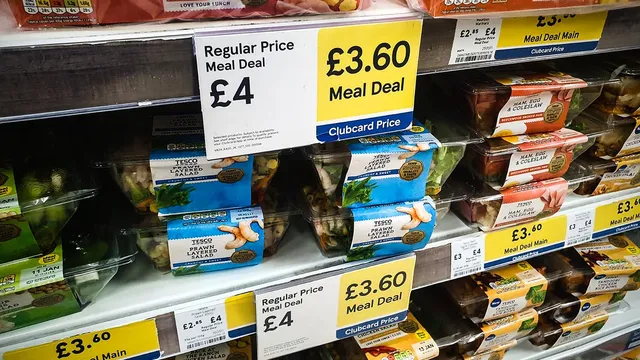
Tesco anticipates drastic profit drop amid supermarket price war
2025-04-10 13:53- Tesco's chief executive has acknowledged that the supermarket is experiencing heightened competition and is aiming for massive cost reductions.
- The company cites a substantial risk of profit decline due to the intensified price war in the grocery sector.
- The ongoing price competition represents both a challenge and an opportunity for consumers seeking better deals in a struggling economy.
Express your sentiment!
Insights
In the UK, a significant price war among major supermarkets has intensified, with Tesco at the forefront of these developments. Tesco's chief executive, Ken Murphy, recently indicated that the company is facing mounting pressure to lower prices in response to an aggressive pricing strategy implemented by competitor Asda, which has pledged to initiate its largest price cuts in 25 years. Tesco forecasts a profit reduction of up to £400 million in the upcoming fiscal year as it navigates through these turbulent economic conditions marked by escalating competition. The impact of this price war comes at a time when food inflation is also a concern for consumers, alongside rising household expenses. The grocery market has undergone considerable changes recently, with emerging discounters, notably Aldi and Lidl, contributing significantly to price pressures. Customers are increasingly exposed to price comparisons across various stores, further compelling supermarket giants to respond with competitive pricing strategies. Despite these challenges, Tesco reported a 3.5% increase in sales for the last financial year, totaling £63.6 billion, and experienced an expansion in its market share to 28.3%, the highest level since 2016. Ken Murphy stated that Tesco remains committed to providing the best value options for consumers while simultaneously identifying further opportunities to enhance their competitiveness. Nevertheless, ongoing price competition may diminish Tesco's current leading position if it cannot adapt swiftly to the changing landscape. Analysts have observed that the price war has already led to billions being wiped off the market valuations of major grocery chains. The relentless march of food inflation, projected to escalate up to 4% later this year, imposes additional pressures, as consumers grapple with the complexities of household budgeting. In this environment, Tesco's cautious profit guidance and the nature of the competitive landscape highlight the vulnerabilities faced by retailers in maintaining their customer bases amid rising costs and intensifying market rivalry.
Contexts
The current supermarket price war in the UK has been a significant development affecting both consumers and retailers alike. As of April 2025, the competition among leading supermarket chains has intensified, with notable players such as Tesco, Sainsbury's, Aldi, and Lidl engaging in aggressive pricing strategies to capture market share. This price competition is largely driven by changing consumer behavior, economic pressures, and increasing living costs, leading to heightened scrutiny of supermarket prices as consumers seek value for money in their grocery shopping. The trend is particularly evident in staple products, such as bread, milk, and fresh produce, where retailers are pushing prices down to attract price-sensitive customers amid rising inflation rates and concerns over household budgets. The impact of this price war extends beyond consumer savings; it also shapes market dynamics. Many supermarkets have adopted loss-leader strategies, reducing prices on certain items to draw in shoppers, hoping they purchase additional products at regular prices. However, this approach comes with financial risks, potentially squeezing profit margins for these retailers. Additionally, smaller and independent grocery stores face challenges in competing with the vast scale and purchasing power of these larger chains, further consolidating market competition while raising concerns regarding the long-term sustainability of the sector. As the price competition evolves, supermarkets are also investing in improving their supply chain efficiency and diversifying their product ranges to ensure customer loyalty. Many retailers are looking to offset losses incurred from aggressive pricing by enhancing the overall shopping experience and introducing loyalty programs. Furthermore, there is an increasing focus on sustainability and local sourcing, as consumers become more mindful of the origin of their products and the environmental impact of their purchases. Supermarkets are responding to this shift by promoting ethical and sustainable products, aligning their offerings with consumer values while still maintaining competitive price points. Looking ahead, the UK supermarket price war is likely to continue evolving, influenced by external economic factors, such as inflation, changes in consumer preferences, and global supply chain challenges. While value-driven competition benefits consumers in the short term, it raises questions about the health of the grocery sector in the long term. Retailers must navigate these challenges carefully, balancing competitive pricing with sustainable business practices to ensure they can thrive in a landscape characterized by ongoing price wars and changing consumer expectations.